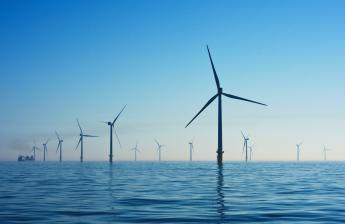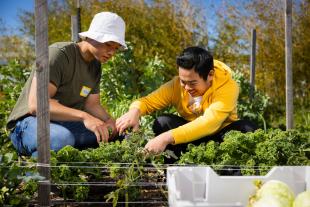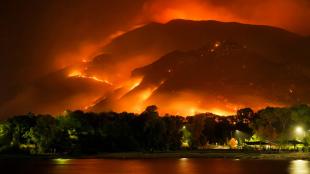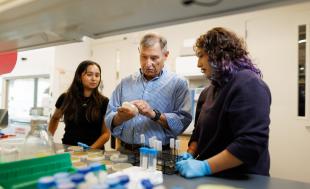How to Fix Climate Crisis on the Central Coast? Cal Poly Researchers Look for Solutions in Ocean, Wind

A team of Cal Poly researchers is launching an effort to coordinate and develop practical local solutions to the unique environmental challenges facing the Central Coast due to the climate crisis.
The collaboration — including Cal Poly faculty, students and staff, plus local stakeholders — will focus on climate resiliency on the Central Coast.
Initially, the team will study the vulnerabilities of the local community to locate areas where major changes or interventions can be made. They will work to understand what impediments to those changes exist and offer climate-smart solutions that help boost the local economy and protect local infrastructure.
This continues and expands prior work by Cal Poly faculty, staff and students in climate action planning. One leverage point the team has identified is the ocean, building off the work of the Center for Coastal Marine Sciences and the momentum to support a strong and sustainable “blue economy” in California.
“The oceans are often cast as one of the many victims of climate change, but they can help improve both our energy and food security and reduce our carbon footprint,” said Benjamin Ruttenberg, an associate professor in the Biological Sciences Department. “Both offshore wind energy and marine aquaculture are nascent industries in California, but now we can study their viability and suggest ways to help them develop in sustainable, responsible ways.”
Additionally, the team plans to collaborate with the SLO Climate Coalition and with students from several departments on campus, including City and Regional Planning, Social Sciences, Electrical Engineering and Computer Science and Software Engineering, to perform GIS-based analysis of local energy usage and resiliency.
The aim of the project is to assess the feasibility of implementing microgrids and other smart grid technologies in local communities.
A microgrid is a decentralized collection of energy sources and users that normally operates while connected to the standard grid but is capable of disconnecting (“island mode”) during grid outages in order to provide uninterrupted power to users.
Another group within the collaborative is studying the environmental and socioeconomic impacts of proposed offshore wind developments off the Central Coast.
“Climate change is the defining challenge of this century, and we have to address it properly,” said Erin Pearse, an assistant professor in the Mathematics Department and an organizer of the research team. “We need this network to ensure there’s always a faculty member there for students who want to get involved and that they’re being supported — they’re our leaders of tomorrow.”
The team also plans to develop climate education courses and expand existing courses that focus on the climate crisis and how to address it. Student researchers will help with developing these courses, researching what is being done at other universities, reaching out to possible partners, and helping share what has been accomplished.
“We are facing an urgent need to develop research strategies and policies that can help us overcome the challenges of climate change and its impacts,” said Renee Reijo Pera, Cal Poly’s vice president for Research and Economic Development. “In particular, we need a focus on how the climate crisis disproportionately affects disadvantaged communities and address this by working collaboratively with members of these communities.”
In addition to Ruttenberg and Pearse, current projects include faculty members from across the university including: Emily Bockmon from the Chemistry Department; Richard Cobb, Natural Resources Management and Environmental Sciences; Charlotte Decock, Natural Resources Management and Environmental Sciences; G. Andrew Fricker, Social Sciences; Adrienne Greve, City and Regional Planning; Alexis Pasulka, Biological Sciences; Majid Poshtan, Electrical Engineering; Seeta Sistla, Natural Resources Management and Environmental Sciences; Taufik, Electrical Engineering; Lars Tomanek, Biological Sciences; Ryan Walter, Physics; Crow White, Biological Sciences; and Yi-Hui Wang, Biological Sciences.
Future projects within the initiative will include faculty with expertise in economics, business, engineering, computer science, communications and social sciences, spanning across all of Cal Poly’s six colleges.
The project is funded through Cal Poly’s Strategic Research Initiatives (SRI) program, a partnership between Academic Affairs, Research and Economic Development and University Development. The SRI program identified proposals from Cal Poly faculty and staff that addressed problems facing the Central Coast, California, and the world as a whole that also placed an emphasis on the role of undergraduate and graduate student research experiences.
For more information about the SRI program, visit https://research.calpoly.edu/strategic-research-initiatives.




